ANSC 1401 BEEF CATTLE
1/43
There's no tags or description
Looks like no tags are added yet.
Name | Mastery | Learn | Test | Matching | Spaced | Call with Kai |
|---|
No study sessions yet.
44 Terms
beef
the meat from cattle other than veal and calves
veal
the meat from veal calves
calf
the meat from calves
bull
a sexually mature, unmastered, bovine male
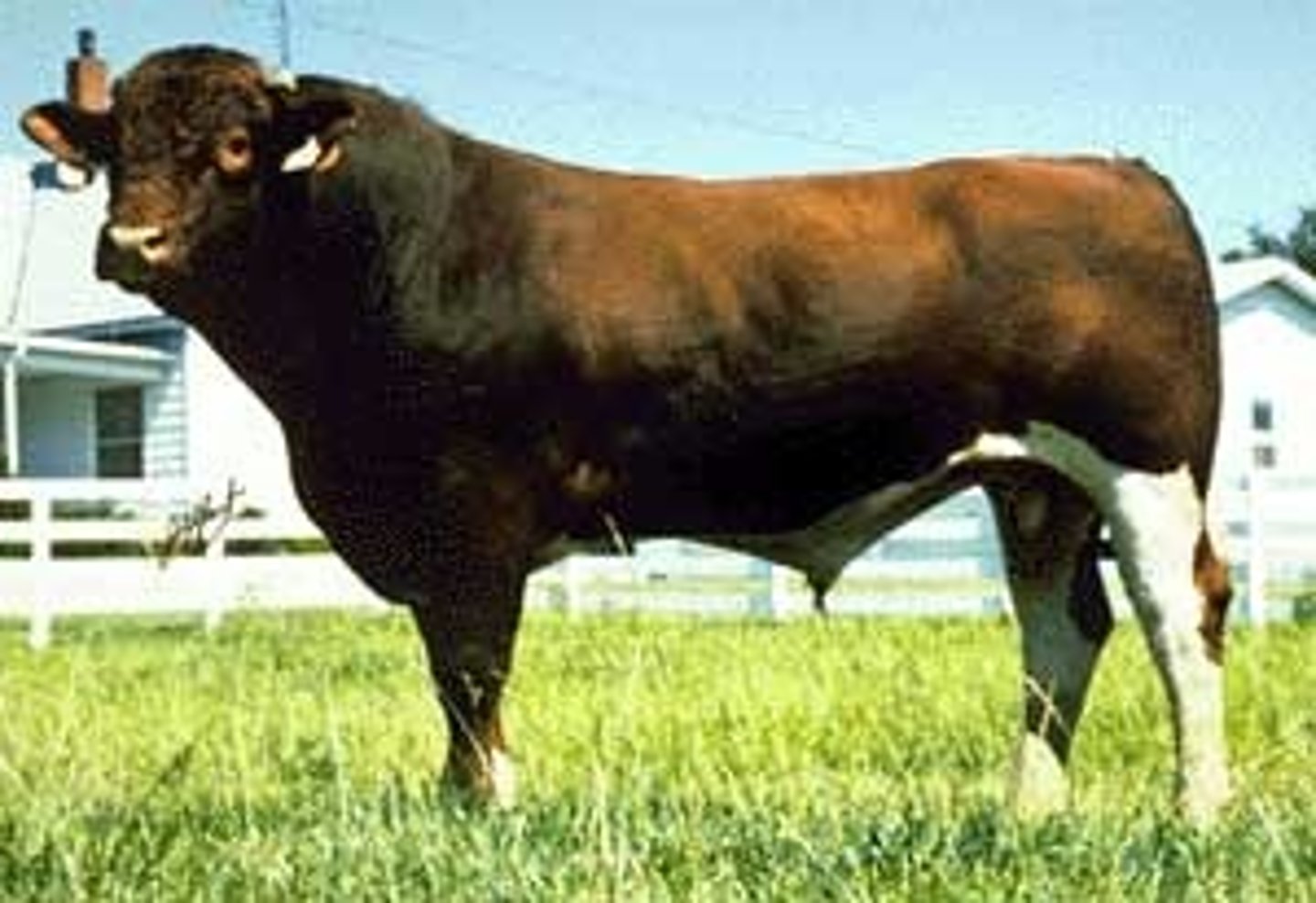
cow
a sexually mature, bovine female
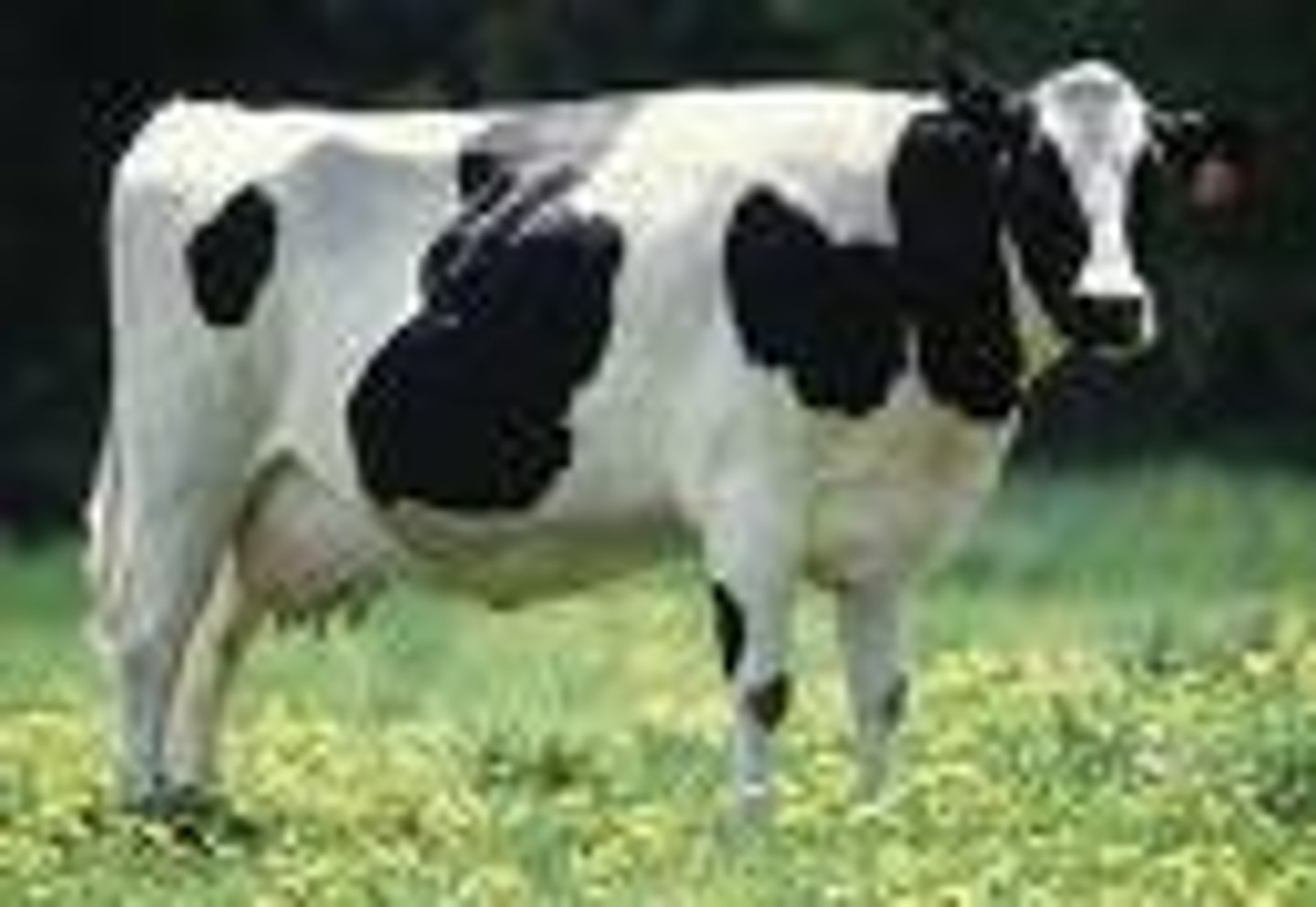
first calf
a term commonly used to indicate the first calf born to bovine females (most are at risk)
freemartin
a sterile heifer born twin to a bull calf (rare); about 90% will not conceive
heifer
a young female bovine before the time that she has produced her first calf
heiferette
female between 2 and 3 years of age that has calved once
steer
a male bovine castrated before reaching puberty
feeder cattle
bovine to be placed in a feedlot and fed a high concentrate diet
slaughter cattle
bovine to ready for slaughter to obtain meat and by-products (stockers become feeders and feeders become slaughter cattle)
herefords and shorthorns
who were the primary breeds until angus cattle?
Angus
BRITISH cattle breed:
-from Scotland
-good milkers and mothers
-certified Angus Beef program
-carcass
-increasing numbers
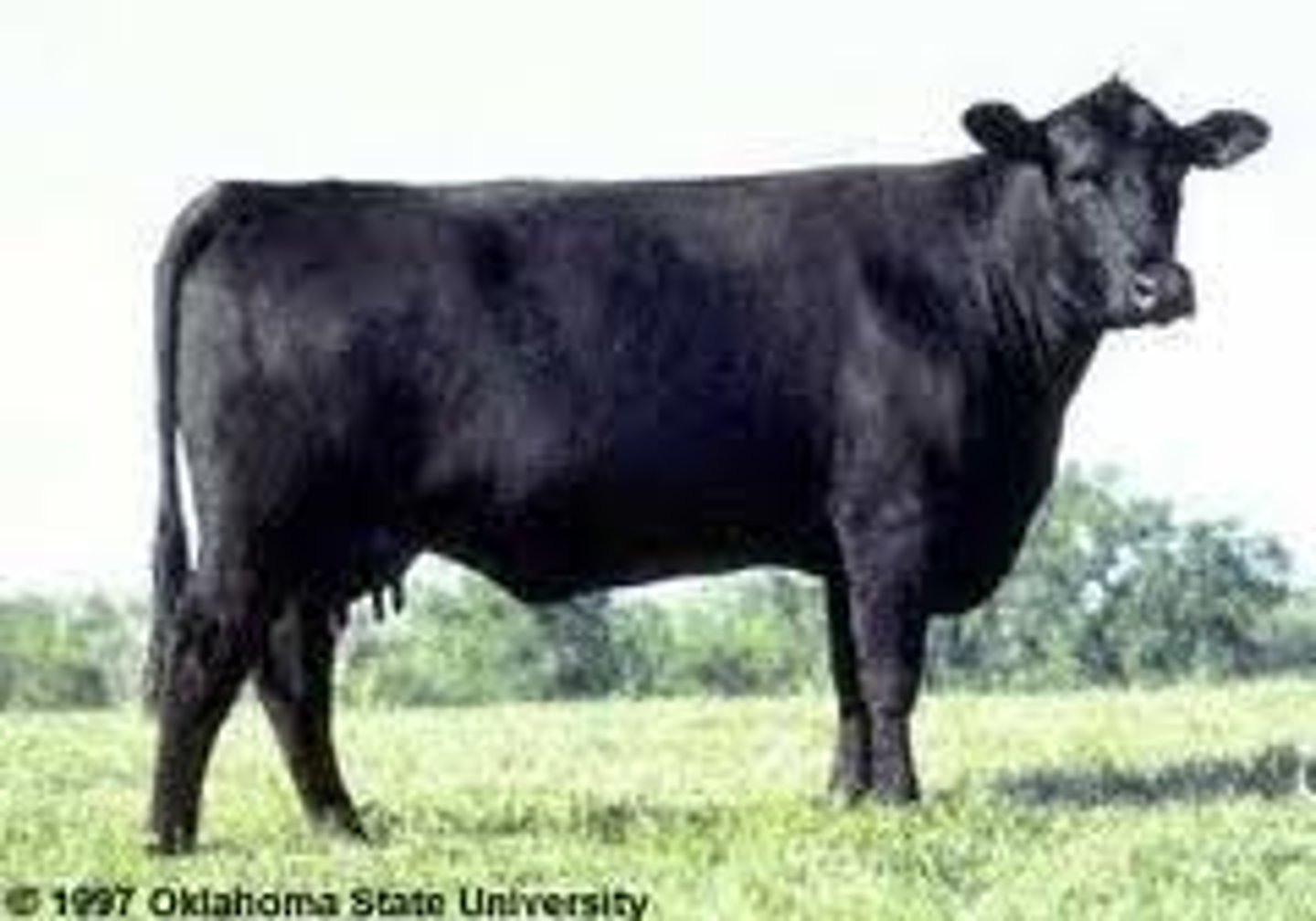
Black Baldies
BRITISH cattle breed:
-not registered as Black Angus
-facial color of Hereford is dominant
-black gene is dominant
-Hereford x Angus
-make excellent commercial female
-CAB program: 51% Angus genetics, black hair coat, no "ear, Average Choice

Red Angus
BRITISH cattle breed:
-red colored gene is recessive
-red hair coat does increase their heat tolerance
-fastest growing breed; breeds true
-more efficient
-good marbling
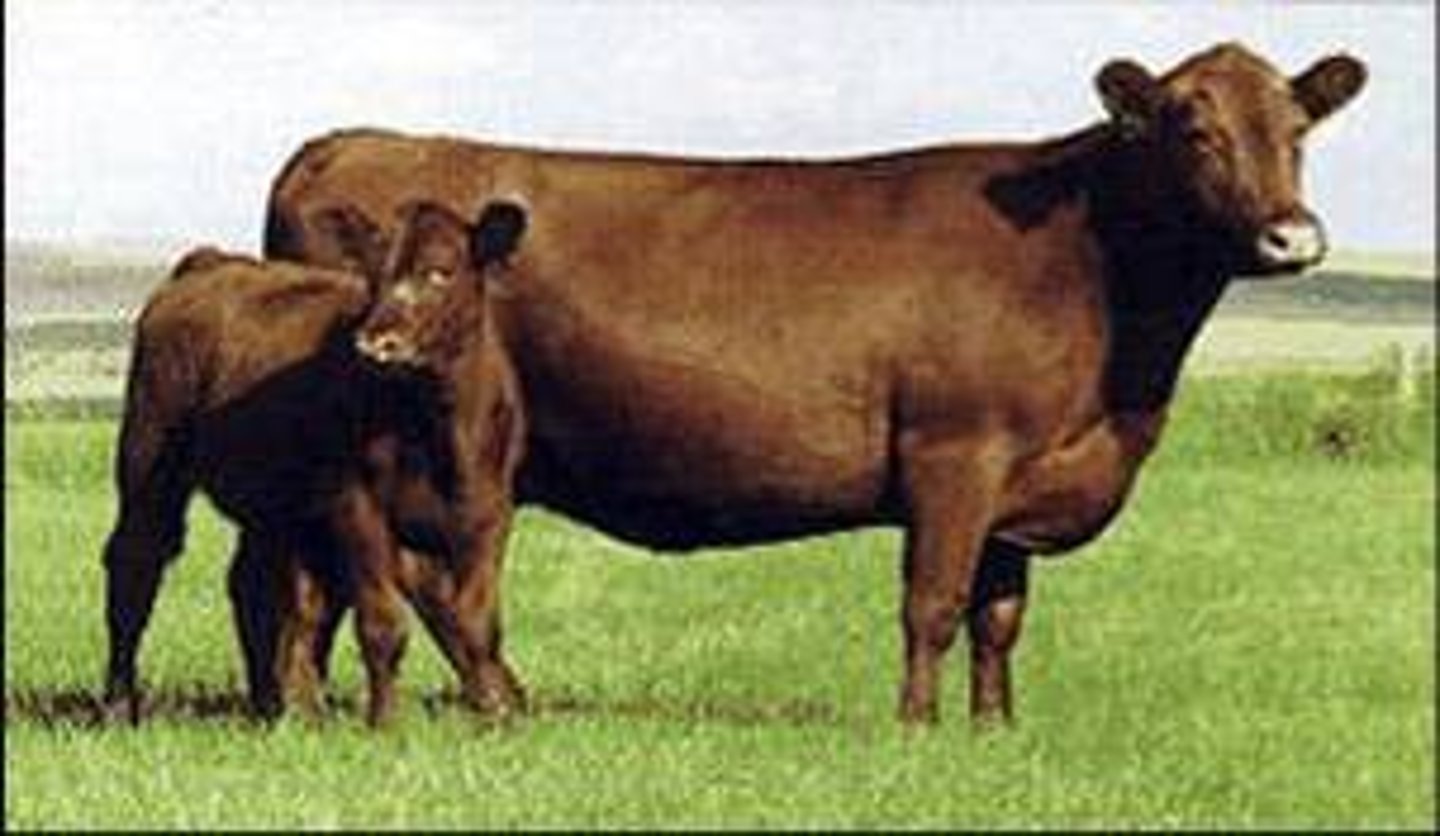
Hereford
BRITISH cattle breed:
-developed in Hereford Shire
-horned or polled (no dehorning needed)
-distinctive color pattern
-"red neck";"cattle that won the west"
-lack of dark pigmentation around their eyes making them prone to pinkeye and cancer eye diseases
-low milk, rugged, fertile
-top 2 of British breeds
-fat stores are used to survive hard times such as droughts and sunburn
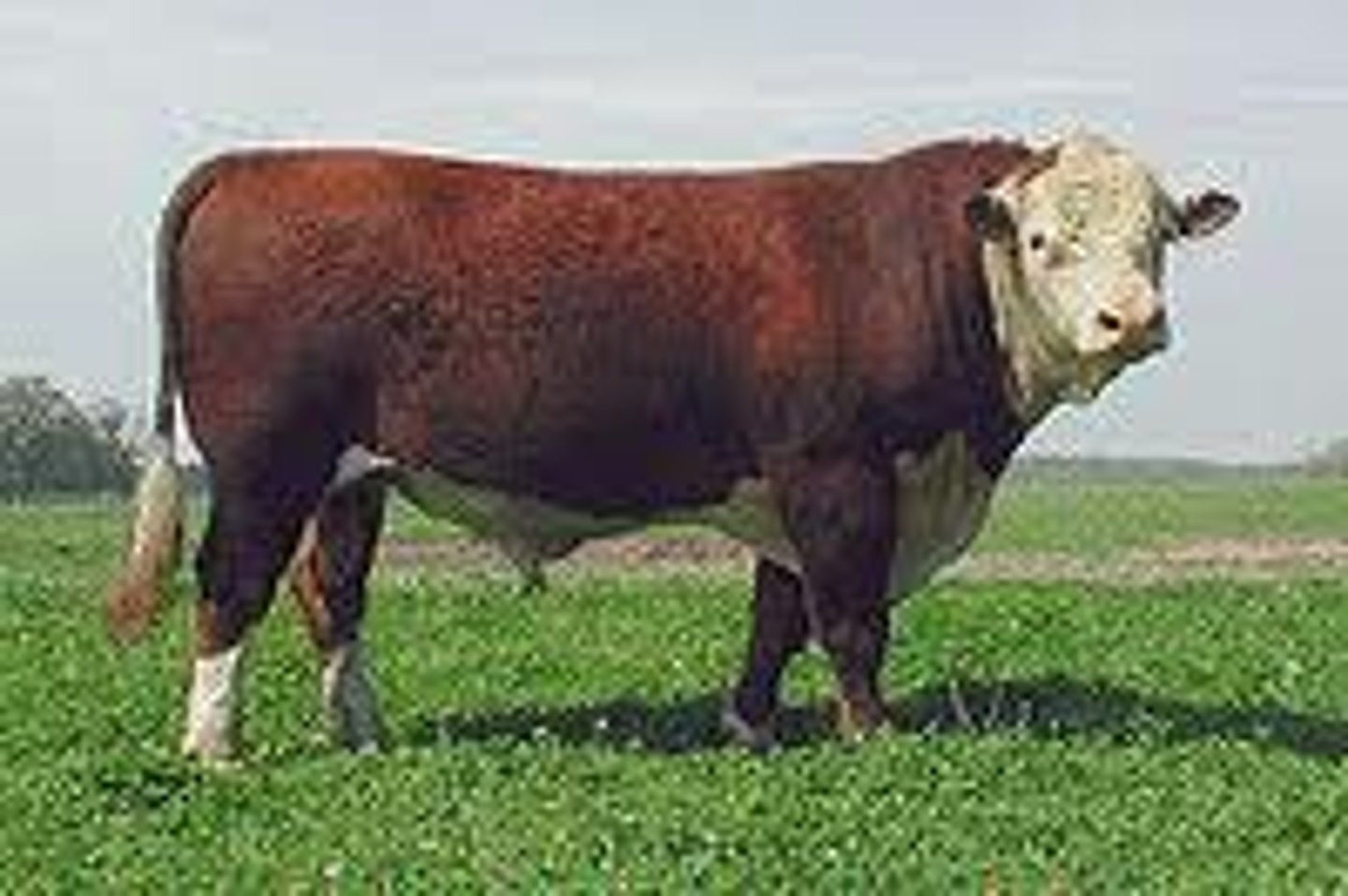
Shorthorn
BRITISH cattle breed:
-developed in Scotland and Britain, England
-shorter-horned than other cattle of the time
-red, white (not most popular) or roan
-horned or polled
-"white heifer disease"
-herdbook was opened to Milking Shorthorn cattle: to try to improve carcass composition and milking ability
-era of fat cattle
-considered 4th popularity/important British breed
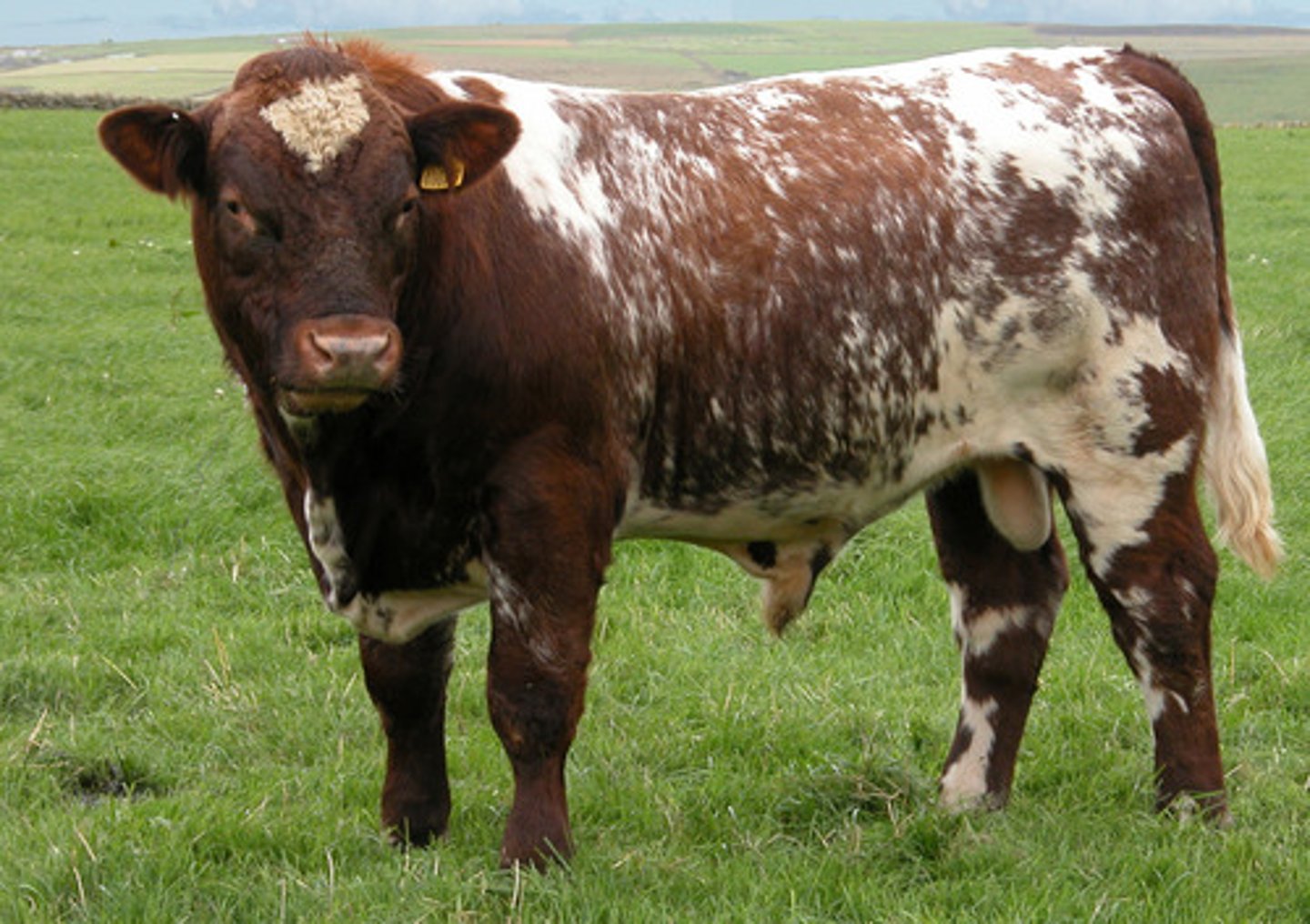
Galloway
BRITISH cattle breed:
-from Northern Scotland, cold and damp
-black or dun, polled with white belted around their bellies
-shaggy coats
-very moderately sized breed
-minor British breed

Continental (European) breed
-imported from the continent of Europe
-called "Exotics"
-selected for work, meat and milk
-tend to be larger framed, heavier muscled, faster growing, less marbling
-cows tend to be poor mothers and less fertile than British breeds
-low fat can beg detriment to survival
Charolais
Continental (EUROPEAN) cattle breed:
-from France
-Amour de Amérique (to yellow)
-white, most are horned
-excellent growth rate, muscular carcasses
-poorly-attached udders, low milk production, (dystocia), low fertility
-terminal sire to cross on an Angus cow base creating a "smoky" calf
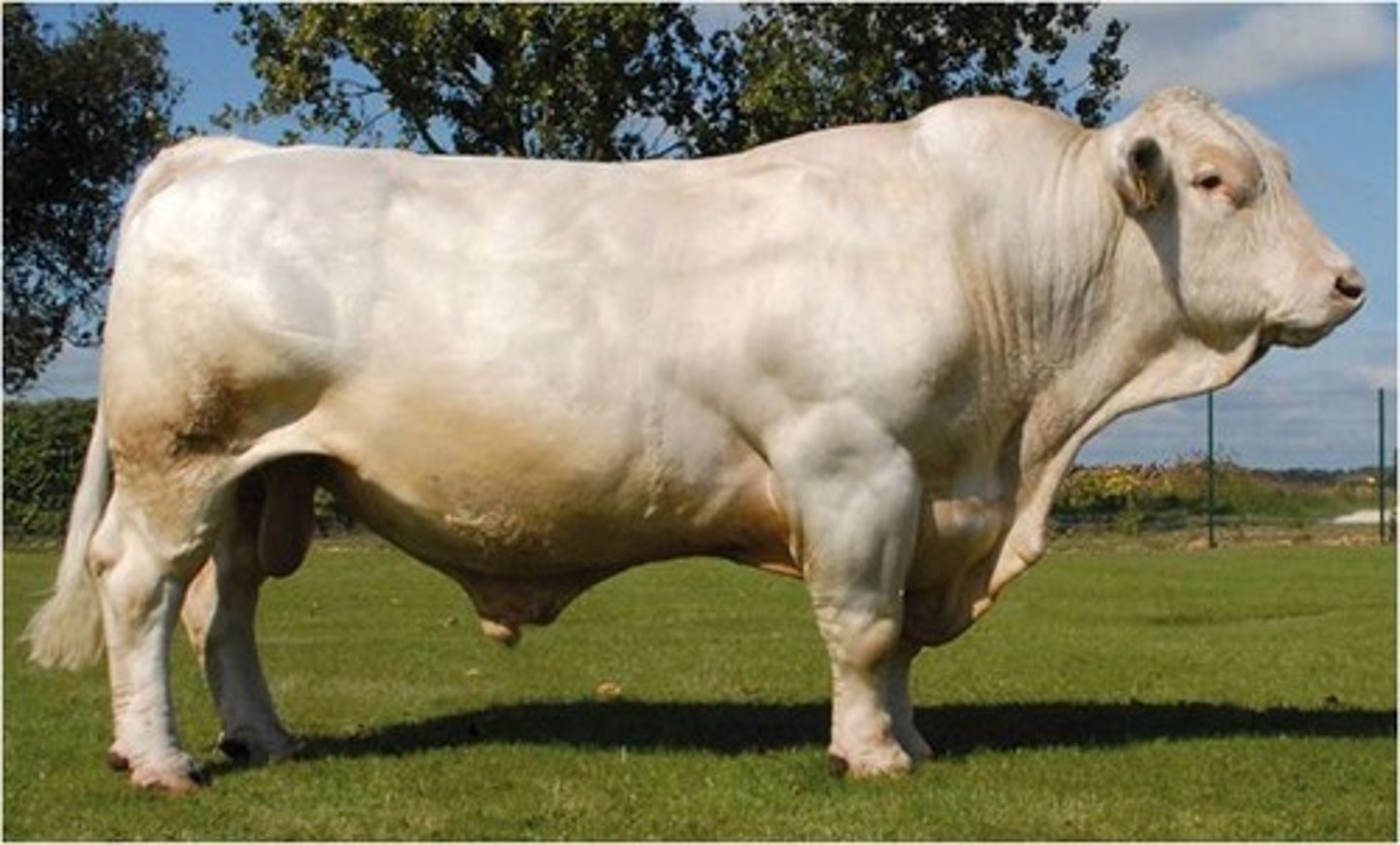
Simmental
Continental (EUROPEAN) cattle breed:
-from Switzerland
-red with white marks, no particular pattern
-polled or horned
-large framed, muscular, more fertile, heaviest milking of Continental breeds
-may not have a calf each year
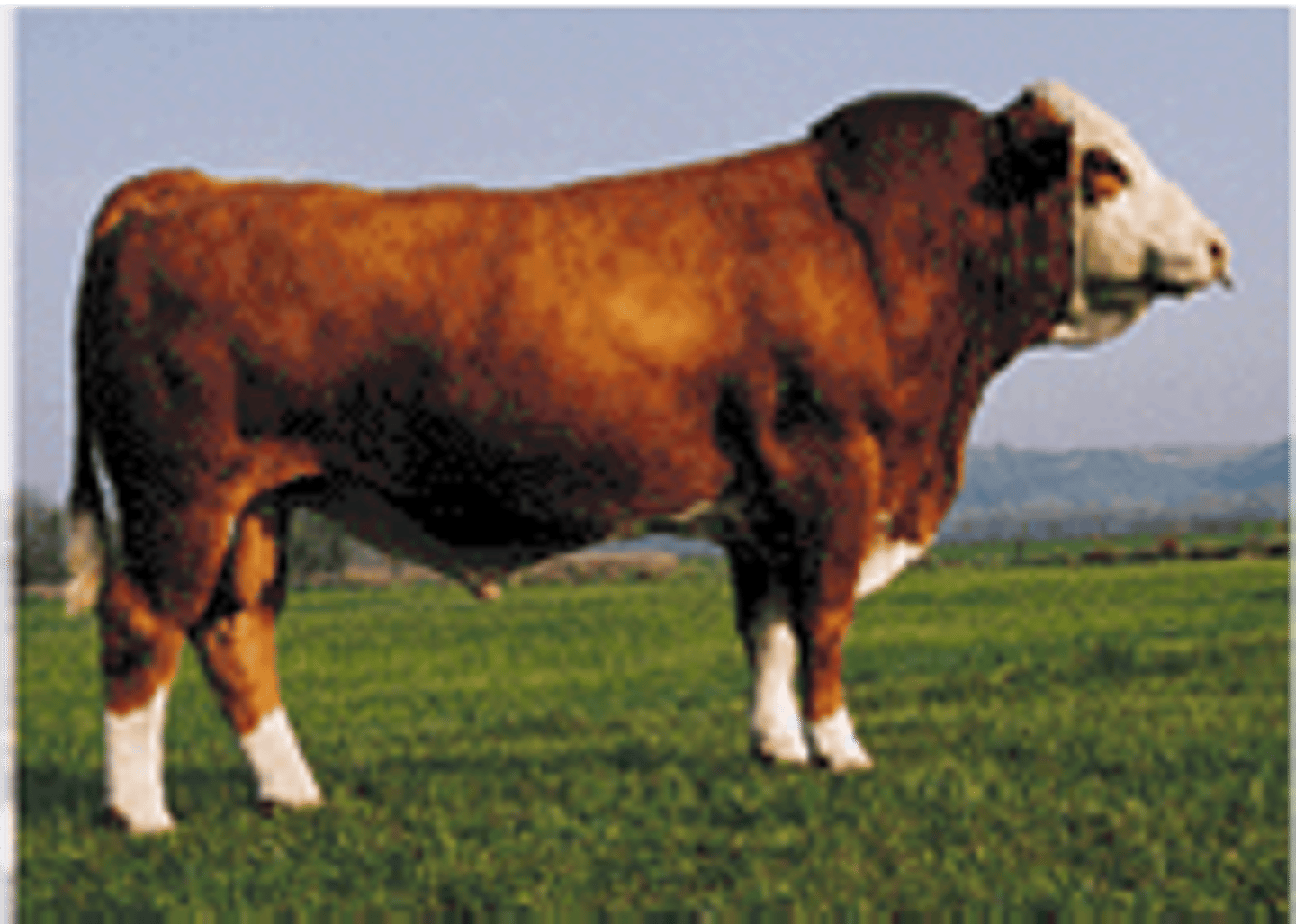
Limousin
Continental (EUROPEAN) cattle breed:
-from France
-reddish gold in color
-more moderately sized (smaller) than Charolais, very lean, muscular
-horned or polled
-similar to Charolais in carcass traits
-mean, "bad" bull
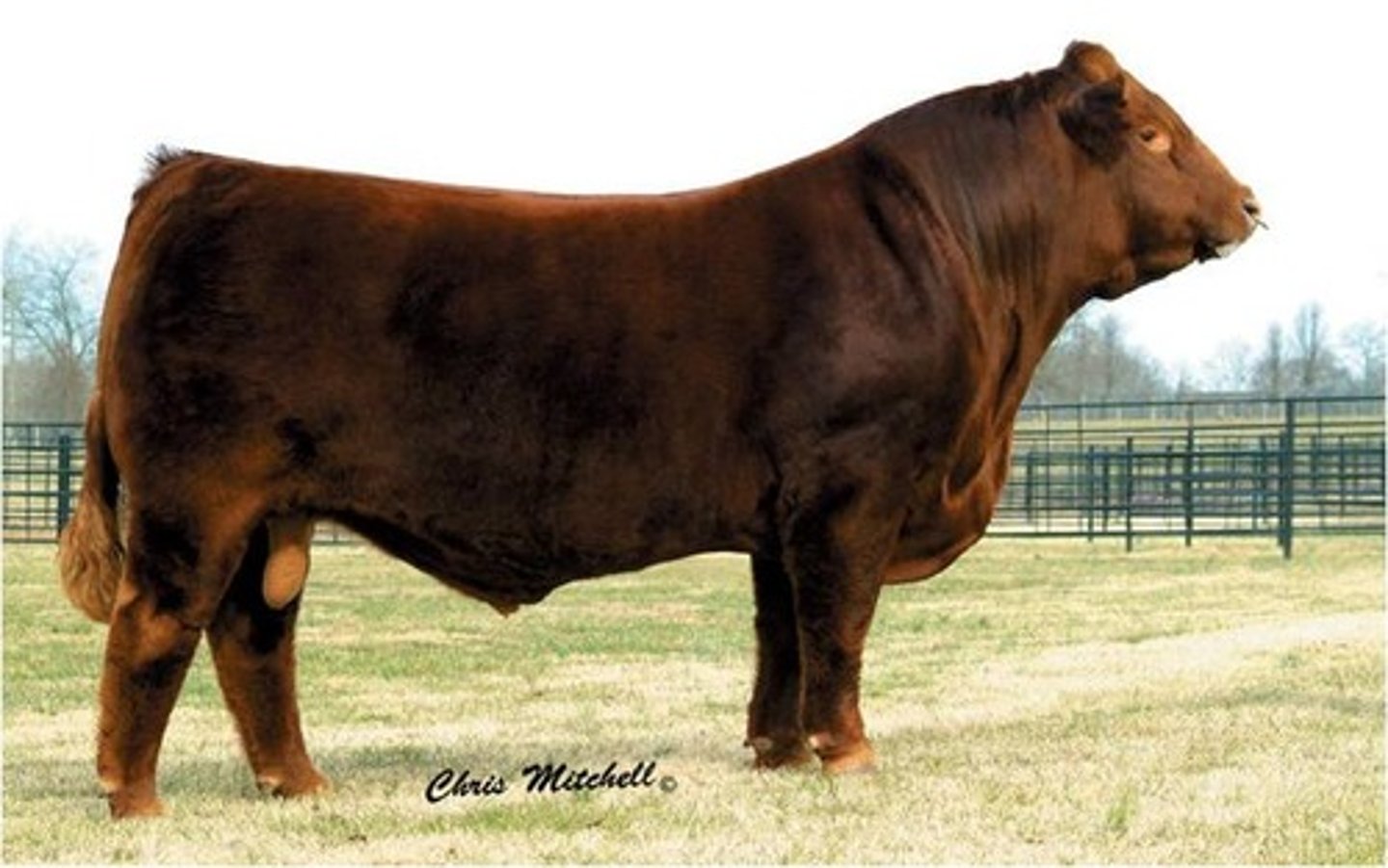
Chianina
Continental (EUROPEAN) cattle breed:
-from Italy
-white hair coat with black skin pigmentation; black is the most common color
-extremely large framed, horned or polled, tallest
-too heavy for today's beef industry
-poor mothers
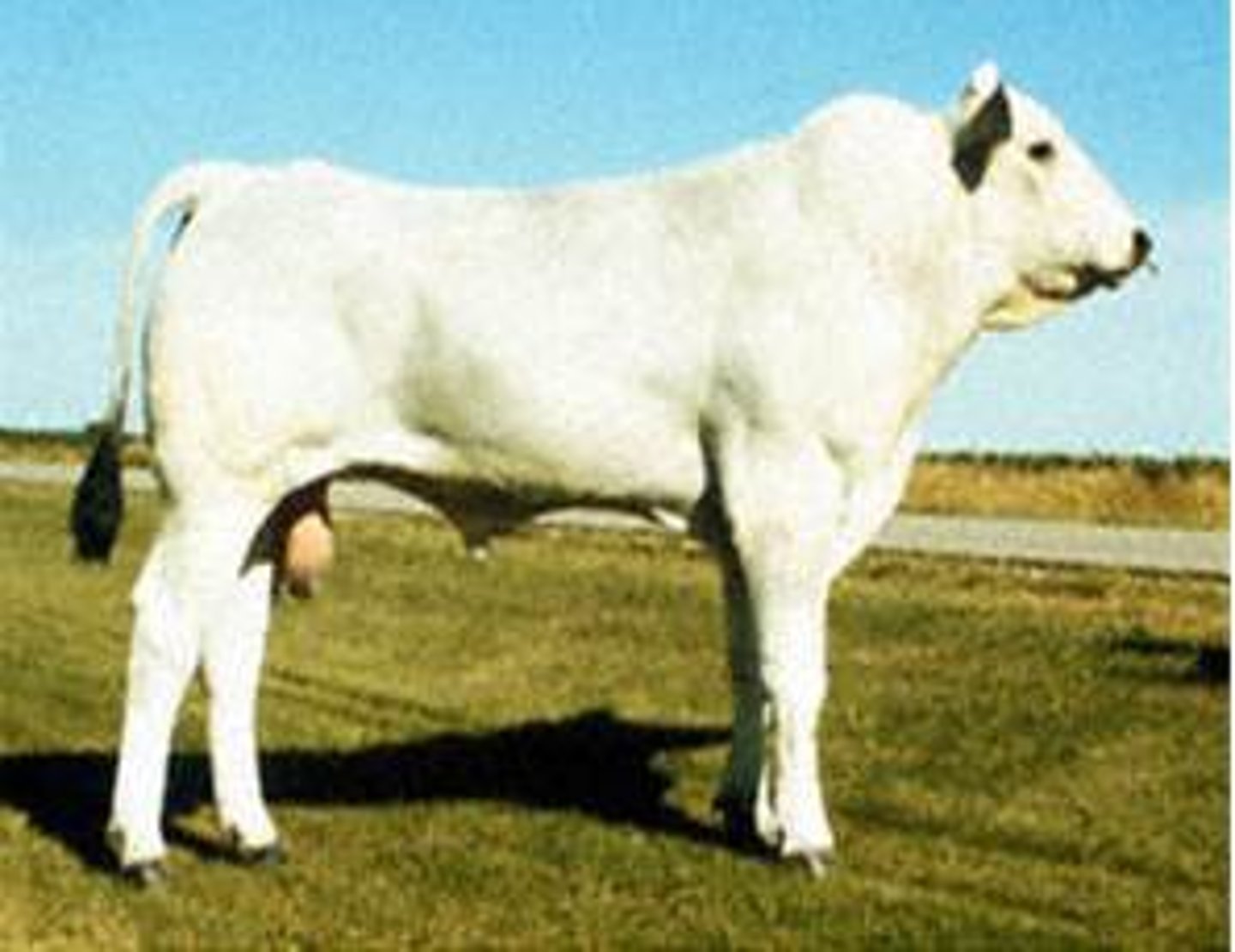
Maine Anjou
Continental (EUROPEAN) cattle breed:
-from France
-red in color with white; black is the most common color
-largest continental breed
-lean, poor udders, low fertility, grow fast, good as sire for cross-breeds
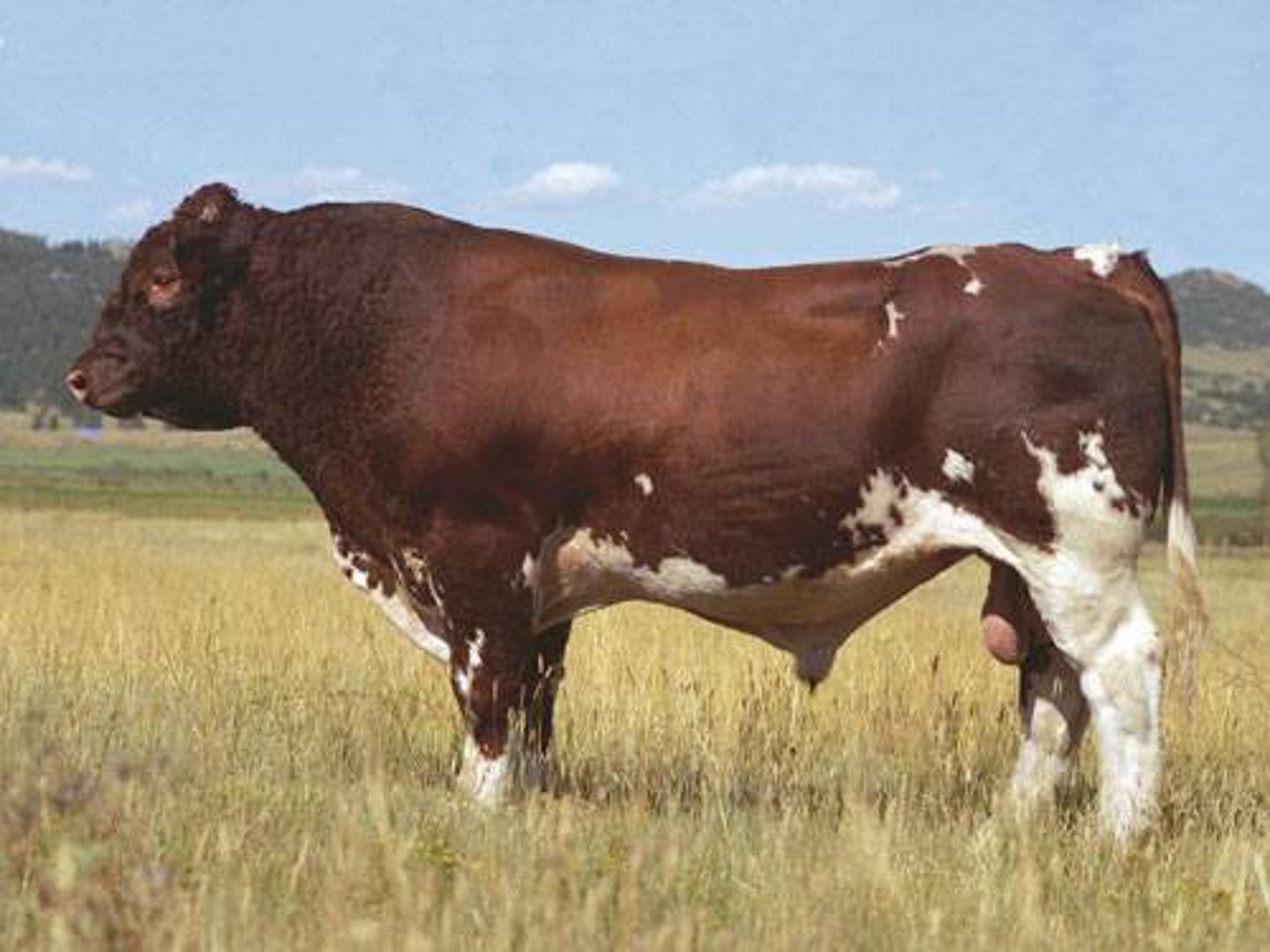
Gelbvieh
Continental (EUROPEAN) cattle breed:
-from Germany and Austria
-golden red colored breed, also black colored
-dual purpose
-moderately sized, excellent fertility, milk production
-muscular

Braunvieh
Continental (EUROPEAN) cattle breed:
-from Switzerland
-grey in color with a light border
-Beef Brown Swiss
-may have large impact on U.S. beef production in future
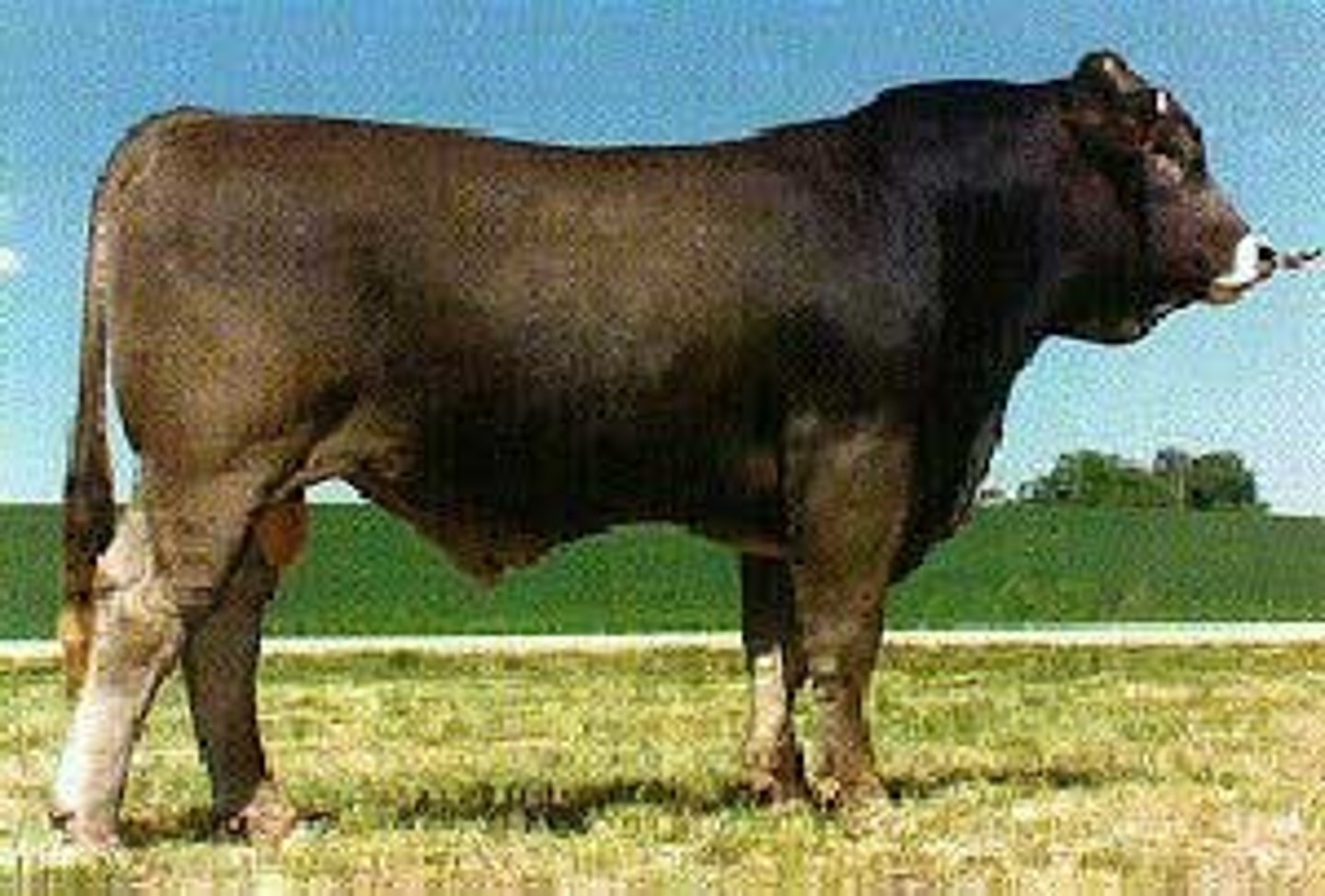
Pinzgauer
Continental (EUROPEAN) cattle breed:
-from Austria, Germany
-dark red (chestnut) to dull black with a white dorsal stripe and underline
-medium to large
-carcass= ok
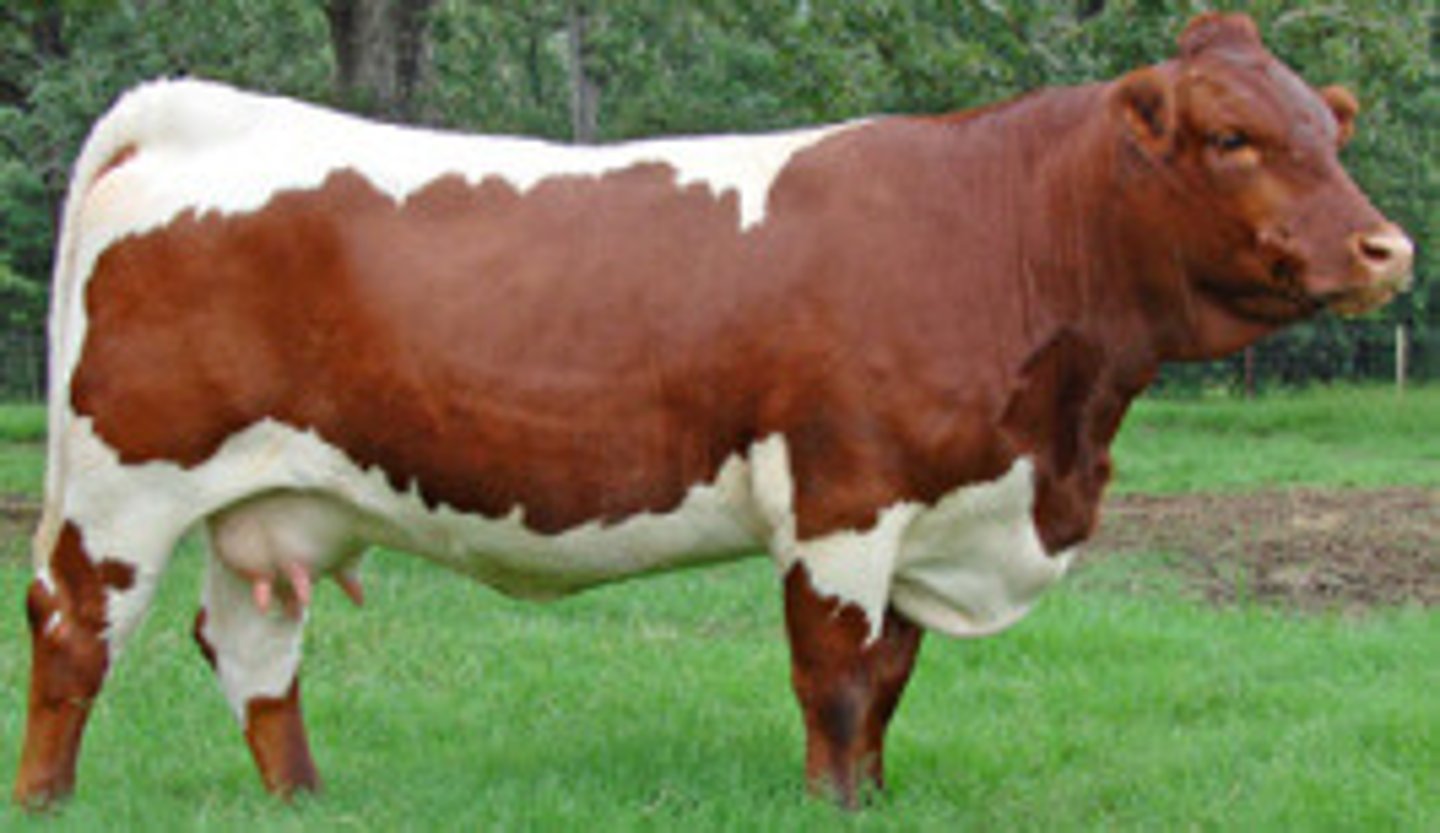
Tarentaise
Continental (EUROPEAN) cattle breed:
-from France
-wheat-colored
-may be too fat and thin muscled
-good on first-calf heifers
-good elevation
-minor breed= least production
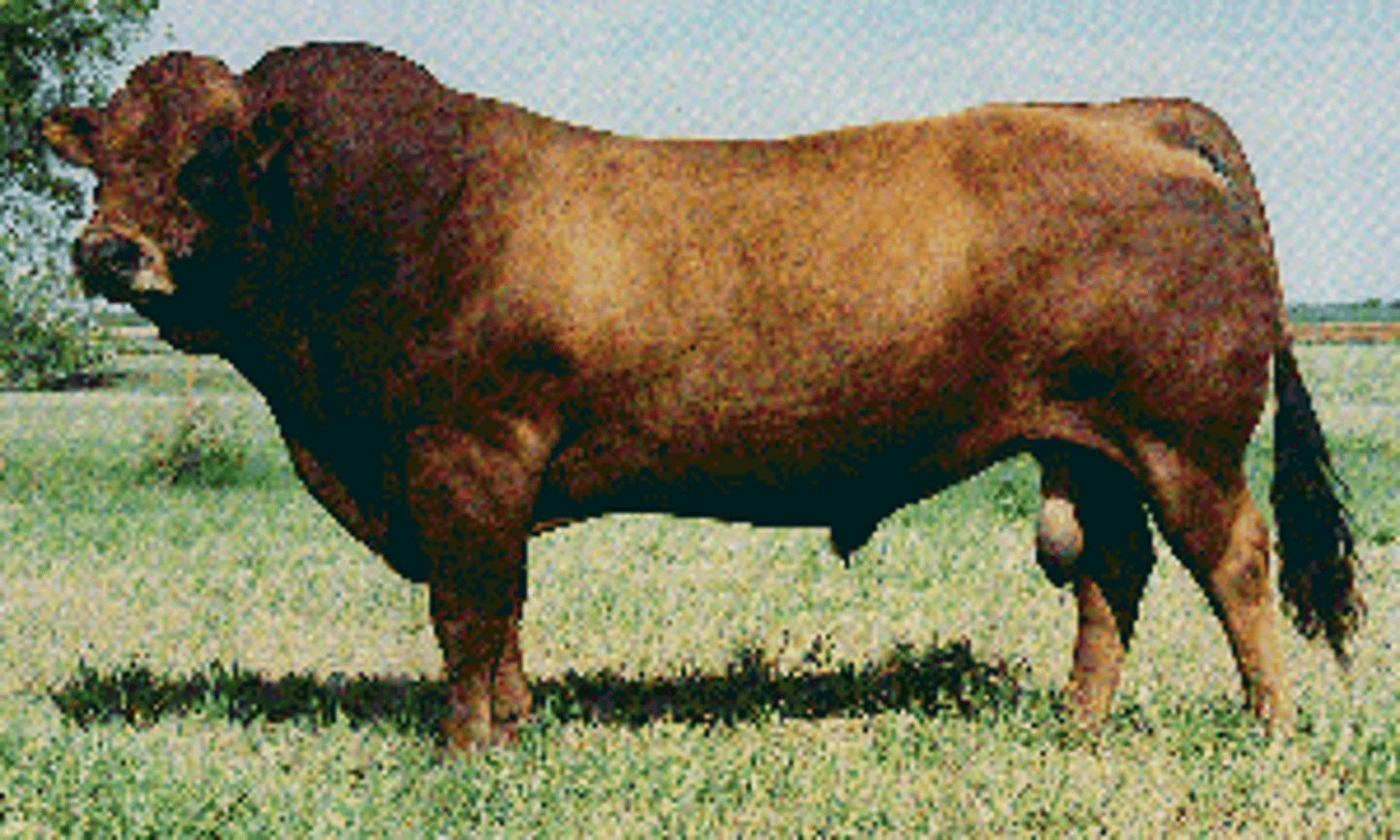
Salers
Continental (EUROPEAN) cattle breed:
-from France
-not heat tolerant
-dark red to black
-horned/polled, long hair
-light birthweight
-done least in U.S.

Belgian Blue (and Belgian White)
Contiental (EUROPEAN) cattle breed:
-from Belgium
-blue-gray or black and white; about 3/100 are white
-double muscling gene
-much ground beef production
-not practice for U.S. beef production systems
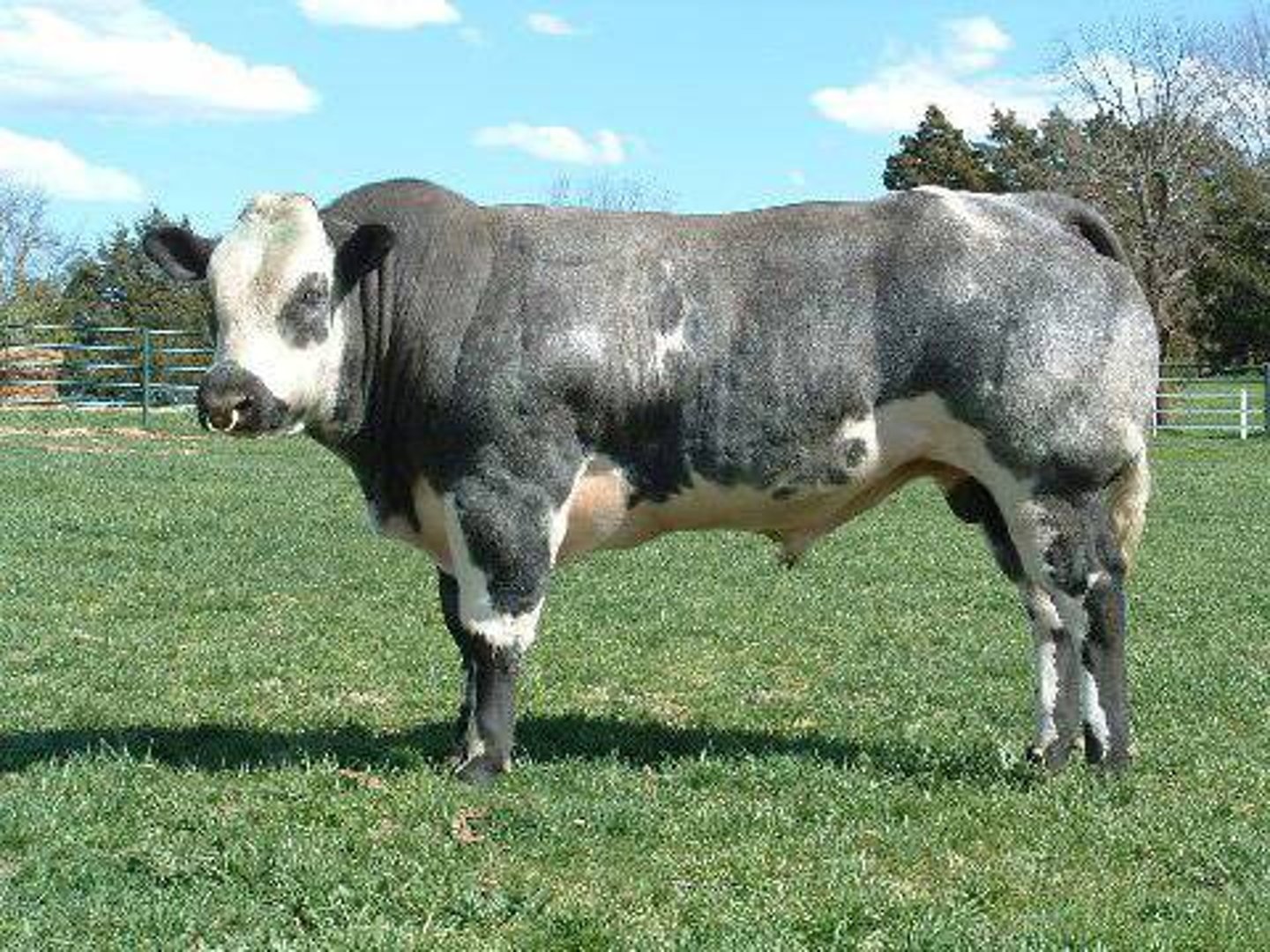
Brahman
American cattle breed:
-4 Indian breeds
-gray and red strains, horned
-used extensively in crossbreeding
-"ears" hump, extra "leather" in Dewlap and Sheath (contain penis) problems
-cow= best use in the cross-bred
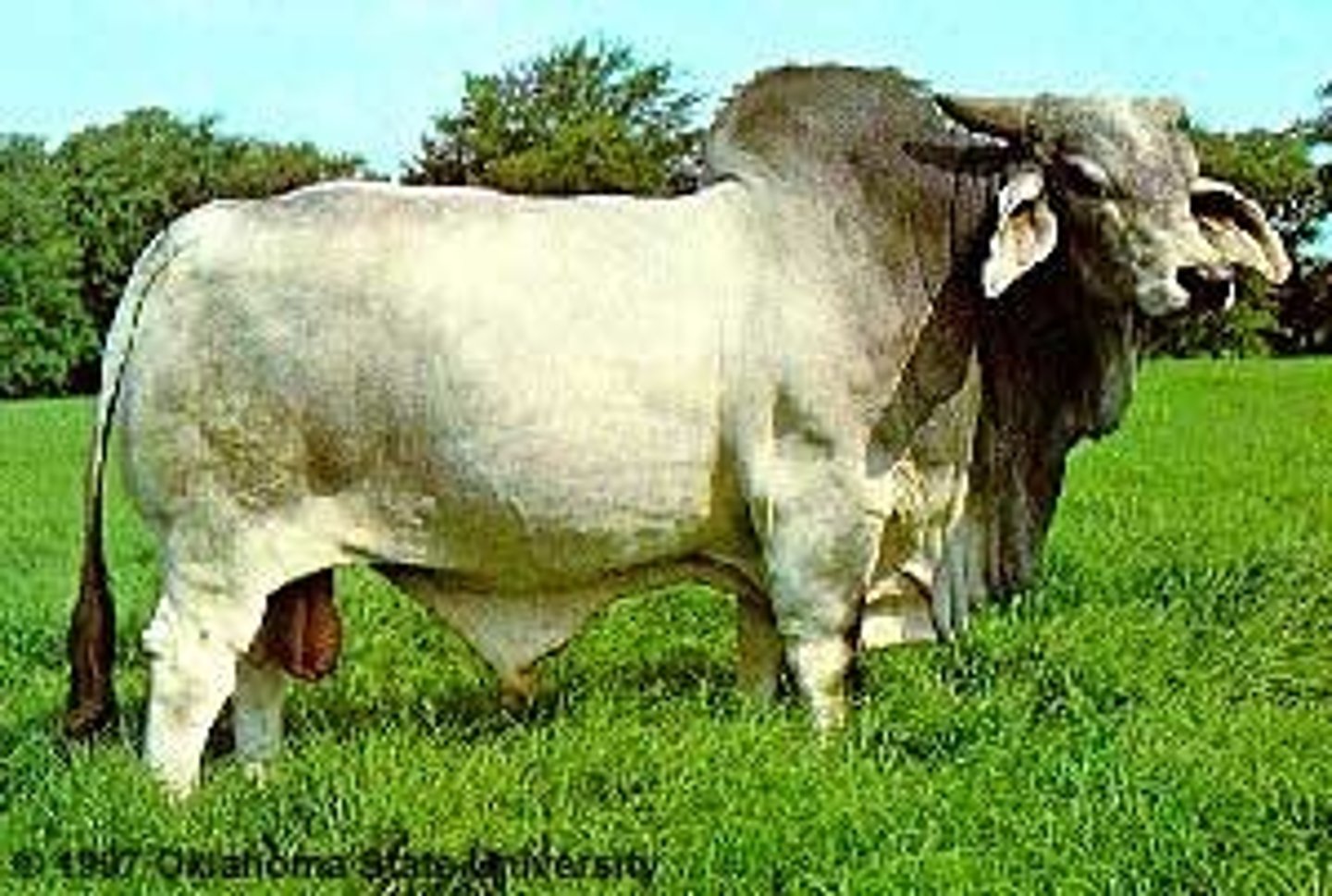
Santa Gertudis
American cattle breed:
-developed at the King Ranch, Kingsville TX
-5/8 Shorthorn, 3/8 Brahman
-"gerts"
-red and horned/polled
-growth, low quality grade
-in 1990, the King Dance created Santa Cruz (5/16 Shorthorn, 3/16 Brahman, 1/4 Red Angus and 1/4 Gelbvieh)= red, better carcass
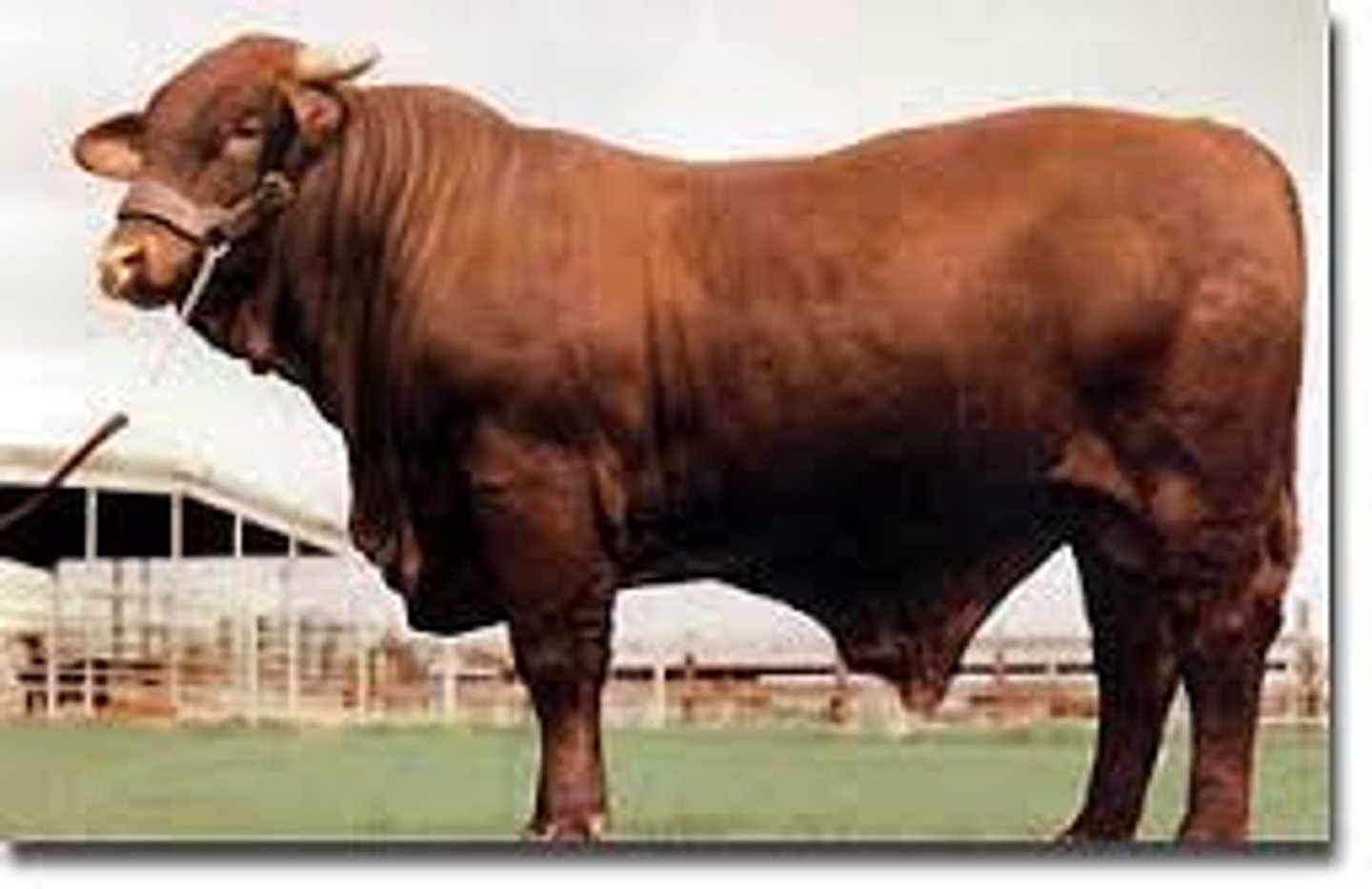
Brangus
American cattle breed:
-5/8 Angus and 3/8 Brahman
-red or black and polled
-extra loose skin-dewlap and sheath
-modified hump
-Brangus pair= one of the better composite
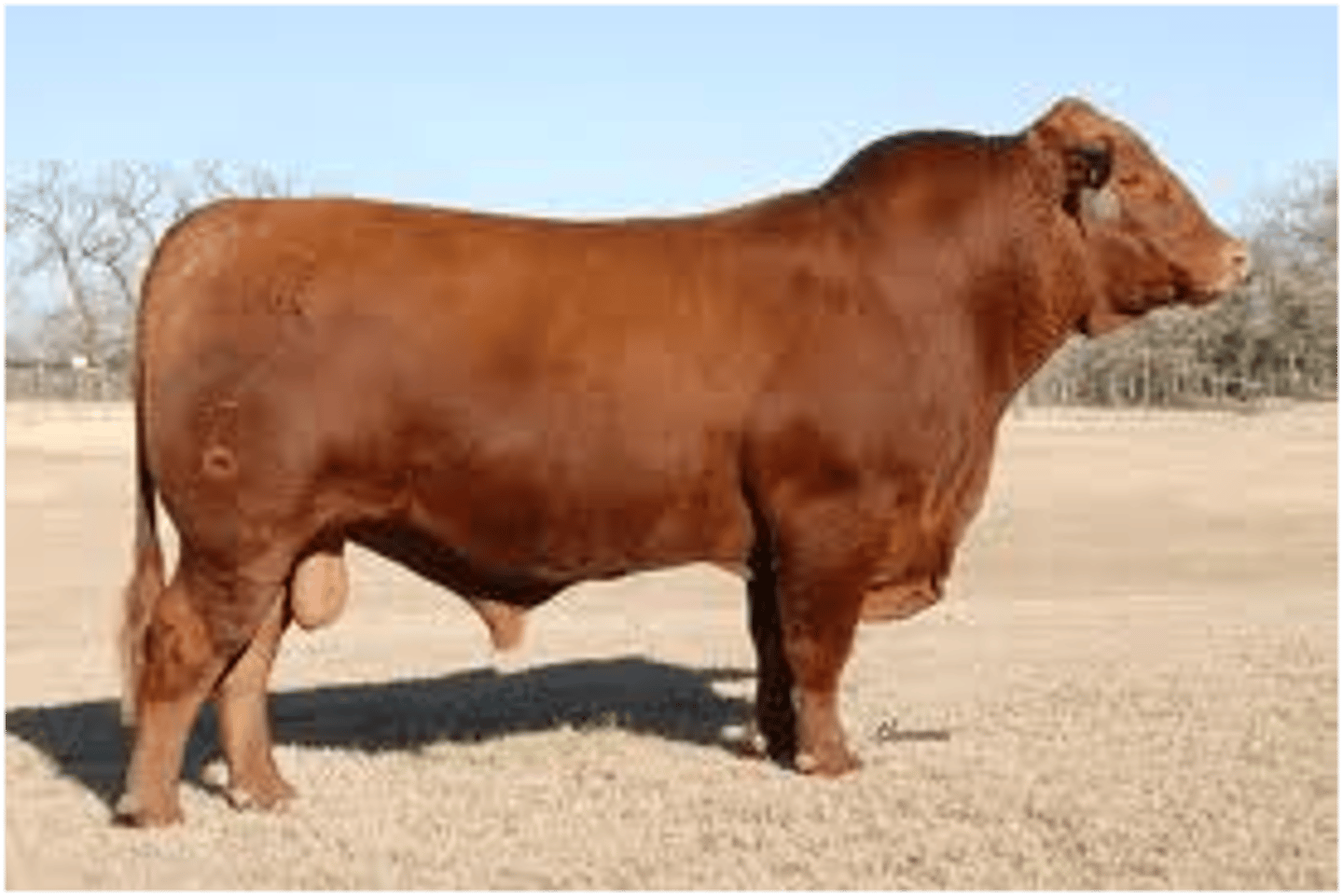
Braford
American cattle breed:
-3/8 Brahman and 5/8 Hereford
-maternal ability
-markings
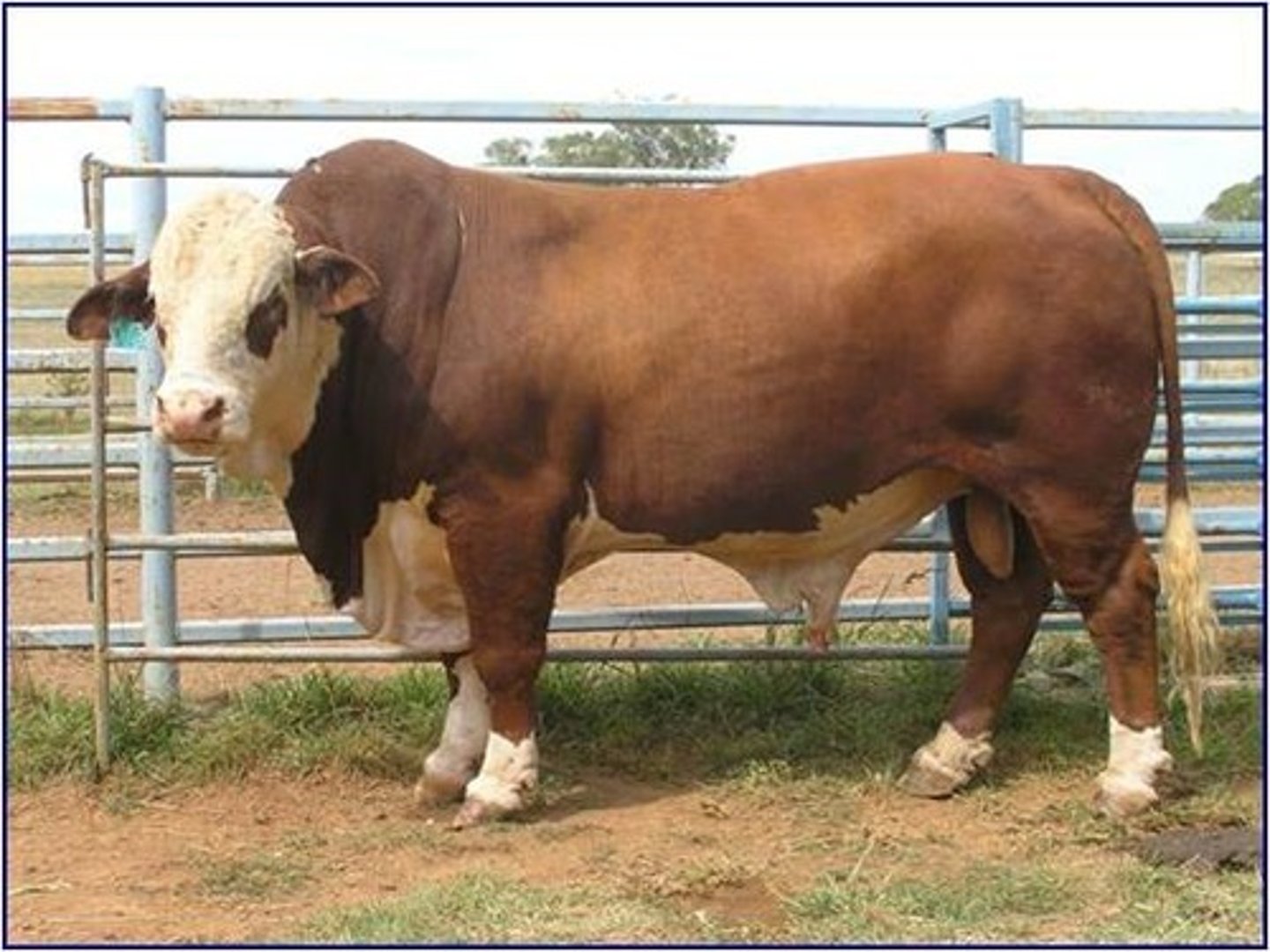
Beefmaster
American cattle breed:
-developed by Tom Lasater
-not any set color pattern (any color)
-breed based Hereford, Shorthorn and Brahman or Brown Swiss
-rapid growth, size, carcass issues
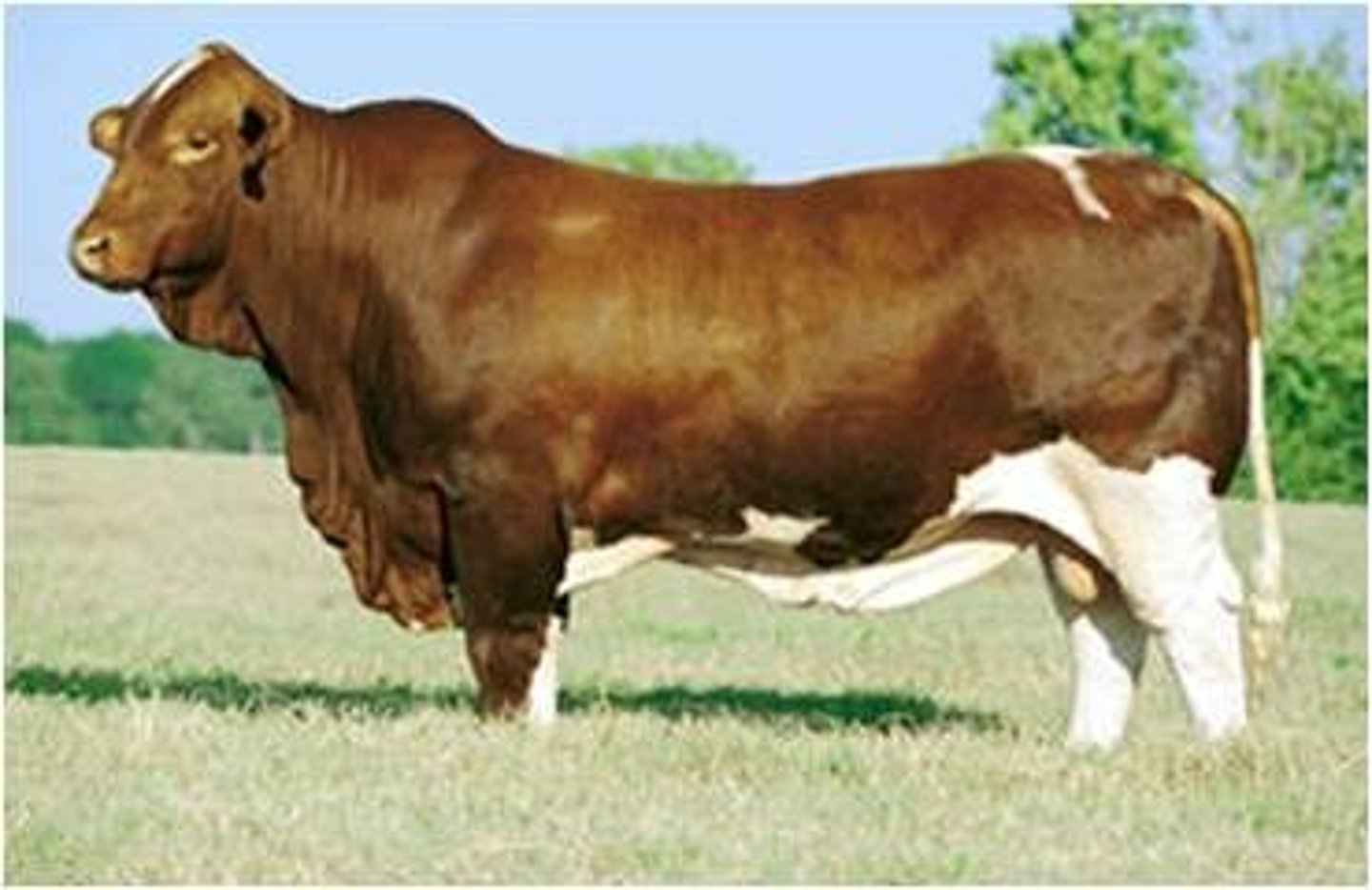
Charbray
-white, horned
-5/8-13/16 or 3/8-3/16 Brahman
-better carcasses than Brahman
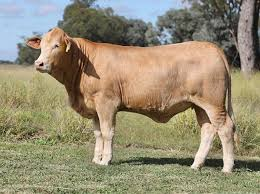
Simbrah
5/8 Simmental and 3/8 Brahman
-colored more like the Simmental
-milking ability
Brahmousin
-cross between Limousine x Brahman
-thick muscling, carcass
Texas Longhorn
Speciality cattle breed:
-Spanish descent= descended from cattle brought to America
-colors vary
-long horns
-hardiness, light muscling
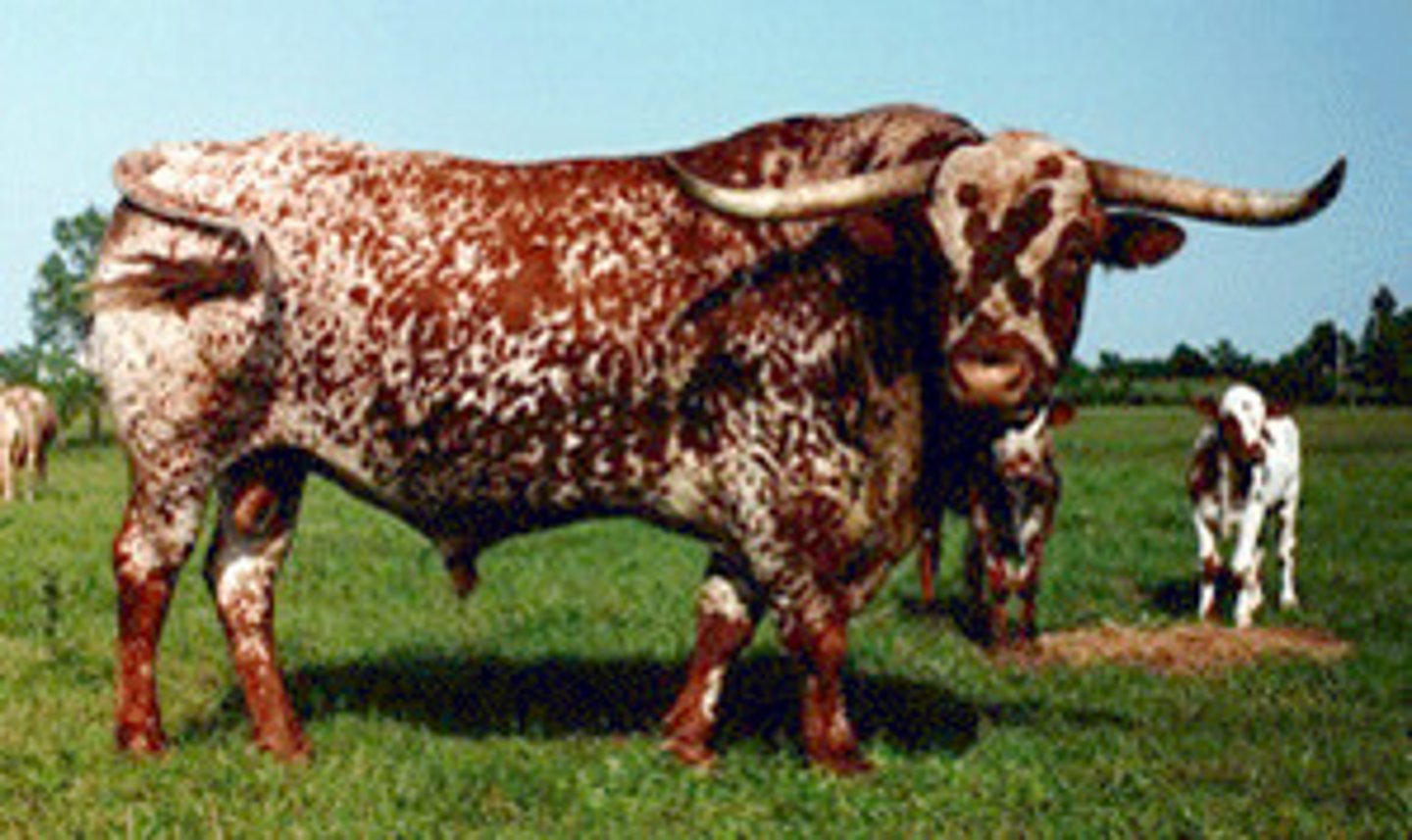
Miniature Hereford
Speciality cattle breed:
-red neck, red legged bull
-pet cattle
-less cancer-eye and sunburn udders

Scotch Highland
Speciality cattle breed:
-Summer hair coat
-longer horns
-shaggy/rugged
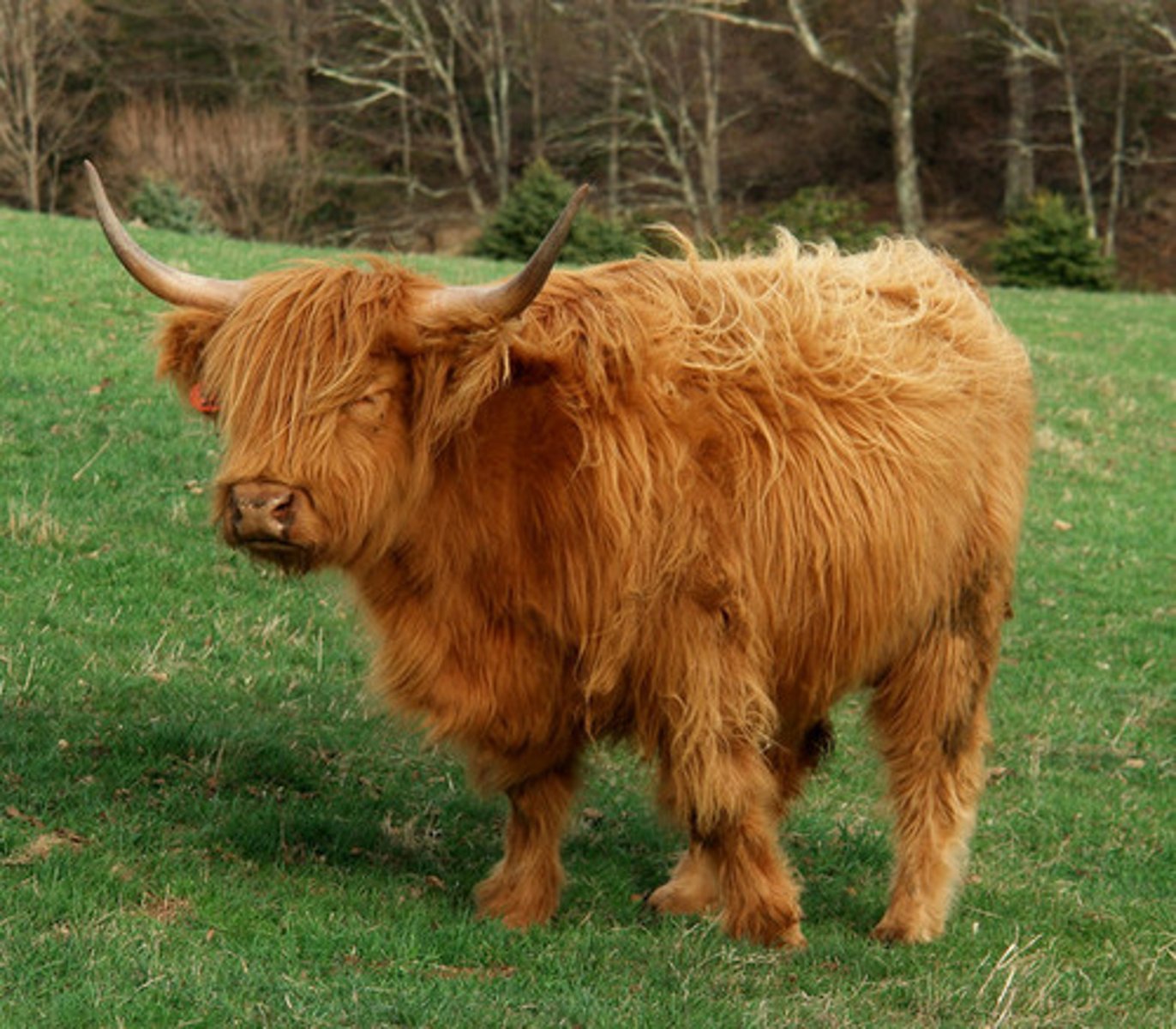
Waygu
Speciality cattle breed:
-Japan breed
-marbling= high
-poor efficiency, slow growth rate
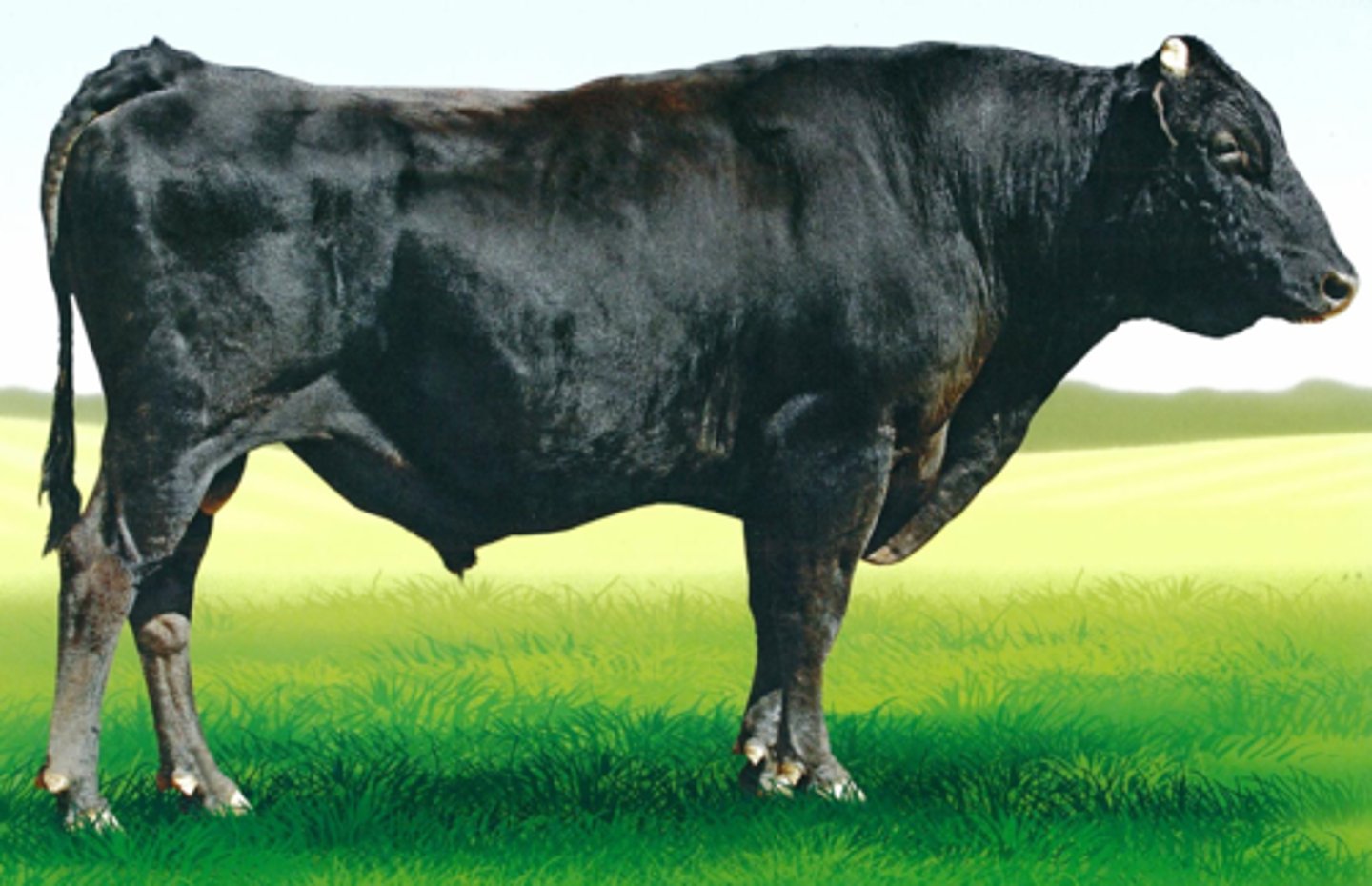
Japan
where is more beef exported from?